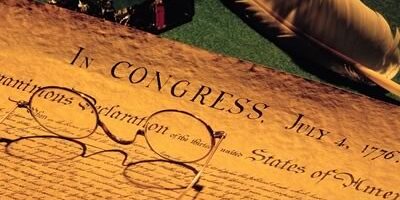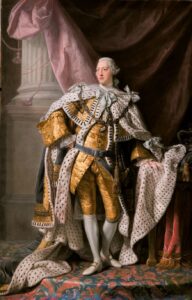 John Hancock, at 24 years of age, witnessed the coronation of King George III (who was 22) in London on September 22, 1761. Hancock had graduated from Harvard in 1754 and was on a business trip for his uncle, Thomas. He was there when George II died, and he wrote his uncle that he hoped the delay of his return would be such that he could witness the coronation, “as it is the grandest thing I shall ever meet with.” The six-hour coronation ceremony cost more than 6 million dollars in our money today. With crowded streets, crowns and other regalia, 42 singers and 105 musicians, feasts, and fireworks, it was a true celebration of royalty.
John Hancock, at 24 years of age, witnessed the coronation of King George III (who was 22) in London on September 22, 1761. Hancock had graduated from Harvard in 1754 and was on a business trip for his uncle, Thomas. He was there when George II died, and he wrote his uncle that he hoped the delay of his return would be such that he could witness the coronation, “as it is the grandest thing I shall ever meet with.” The six-hour coronation ceremony cost more than 6 million dollars in our money today. With crowded streets, crowns and other regalia, 42 singers and 105 musicians, feasts, and fireworks, it was a true celebration of royalty.
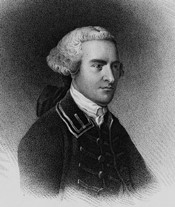 In 1764, at 27 years of age, after the death of his uncle, John Hancock became one of the wealthiest men in America when he inherited the “House of Hancock.” John, born in Braintree in 1737, lost his father, Rev. John Hancock, when he was 7. His mother sent him to live with his wealthy uncle in Boston. After his death, John moved into the Hancock mansion on top of Beacon Hill. Harlow Unger writes: “Hancock loved his wealth. He reveled in it. He adored all the foppish trappings it could buy: the fashionable wigs, frilled shirts, silk and velvet jackets and breeches – and the shoes with silver or gold buckles that sparkled as he strode along Boston’s Hancock Wharf…. He owned Beacon Hill. His land covered its crest, and his was the only house there.”
In 1764, at 27 years of age, after the death of his uncle, John Hancock became one of the wealthiest men in America when he inherited the “House of Hancock.” John, born in Braintree in 1737, lost his father, Rev. John Hancock, when he was 7. His mother sent him to live with his wealthy uncle in Boston. After his death, John moved into the Hancock mansion on top of Beacon Hill. Harlow Unger writes: “Hancock loved his wealth. He reveled in it. He adored all the foppish trappings it could buy: the fashionable wigs, frilled shirts, silk and velvet jackets and breeches – and the shoes with silver or gold buckles that sparkled as he strode along Boston’s Hancock Wharf…. He owned Beacon Hill. His land covered its crest, and his was the only house there.”
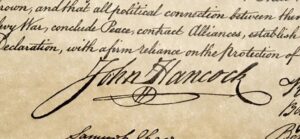 Two individuals, separated by an ocean, who both loved wealth and prestige, were destined to be in direct opposition to one another on July 4, 1776. Two-thirds of the Declaration called King George III a tyrant, and the largest signature, three times bigger than any other, was that of John Hancock. John, who loved his wealth and the natural monopoly of trade in Boston, also wanted to avoid politics due to its negative consequences.
Two individuals, separated by an ocean, who both loved wealth and prestige, were destined to be in direct opposition to one another on July 4, 1776. Two-thirds of the Declaration called King George III a tyrant, and the largest signature, three times bigger than any other, was that of John Hancock. John, who loved his wealth and the natural monopoly of trade in Boston, also wanted to avoid politics due to its negative consequences.
What could have caused him to be willing to lose two ships, the Lydia and the Liberty, to the British, as well as become a Boston Selectman and Legislator in the General Court, standing for liberty at the cost of his wealth? The Sugar Act of 1764 was certainly a catalyst, for this arbitrary tax would cost him dearly, but I believe the real root for Hancock’s maturing convictions was his faith.
Samuel Cooper of Brattles Church in Boston was John Hancock’s pastor. Also in his church were Sam Adams, John Adams, James Bowdoin, and Dr. Joseph Warren. Cooper virtually shepherded some of the most influential patriots of his time. He preached the gospel without the political trappings that would have turned the church into a revolutionary machine. He had both Loyalists and Patriots sitting in the pews. Of course, as the pressure intensified in the middle 1770s, those who left for England caused the congregation to become a unified target for British vengeance. Hancock, a man desiring to be out of the spotlight, was thrust onto the stage at the perfect time with patriotic convictions inspired by his pastor.
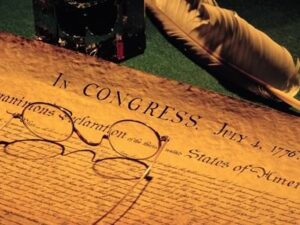 The Bible’s warnings against tyranny inspired John Hancock. The 31 clauses of the Declaration written against King George III fall into five categories. In addition, the Declaration itself is a document of interposition, where a lower magistrate interposes between the tyranny of a higher power and the people. The closing clause, “A Prince, whose character is thus marked by every act which may define a Tyrant, is unfit to be the Ruler of a free People,” transcends King George III, for the same threats have been repeated throughout history.
The Bible’s warnings against tyranny inspired John Hancock. The 31 clauses of the Declaration written against King George III fall into five categories. In addition, the Declaration itself is a document of interposition, where a lower magistrate interposes between the tyranny of a higher power and the people. The closing clause, “A Prince, whose character is thus marked by every act which may define a Tyrant, is unfit to be the Ruler of a free People,” transcends King George III, for the same threats have been repeated throughout history.
Obstruction of Justice – Isaiah 1:17 declares: “Seek justice, rebuke the oppressor, defend the fatherless, plead for the widow.” Clause 8 of the charges against King George III states that he “has obstructed the Administration of Justice by refusing his Assent to Laws for establishing Judiciary Powers.” The King refused to acknowledge local courts, wanting justices dependent on the Crown.
– William Blackstone wrote in 1753: “To bereave a man of life, or by violence to confiscate his estate, without accusation or trial, would be so gross and notorious an act of despotism, as must at once convey the alarm of tyranny throughout the whole kingdom.”
Military Bullying of Civil Power – 1st Timothy 2:1-2 declares the purpose of civil law is to help us “lead a quiet and peaceable life.” This means it is limited. Clause 12 of the charges states: “He has affected to render the Military independent of and superior to the Civil Power.” Political bullying has been a trait of tyranny for centuries. The military, if not checked by civil law, becomes a force of tyranny.
– James Madison wrote in 1795: “Of all the enemies to public liberty, war is, perhaps, the most to be dreaded, for it comprises and develops the germ of every other… no nation could preserve its freedom in the midst of continual warfare.”
Abuse of Power – Proverbs 29:2 states, “When the righteous are in authority, the people rejoice, but when a wicked man rules, the people groan.” Clause 18 charges the King with “depriving us, in many cases, of the benefit of Trial by Jury.” Exercising power beyond one’s lawful jurisdiction is tyranny.
– John Locke wrote in 1690 that tyranny is “the exercise of power beyond right.”
Using Chaos to Gain Control – Genesis 4:7 declares that God told Cain, “Sin lies at the door; its desire is for you, but you are to rule over it.” That sin was anger and violence. Clause 27 charges the King with “domestic insurrections among us.” A wicked ruler uses chaos to gain tyrannical control.
– Alexander Hamilton wrote in 1788: “Are not popular assemblies frequently subject to the impulses of rage, resentment, jealousy, avarice… and violent propensities? …governed by a few individuals?” Sound government was necessary to curtail the influence of mobs.
The Promotion of Corruption – Isaiah 5:20 states: “Woe to those who call evil good, and good evil; who put darkness for light.” And Isaiah 10:1-2 says, “Woe to those who decree unrighteous decrees, who write misfortune, which they have prescribed to rob the needy of justice… that widows may be their prey.” Clause 28 makes the charge that, “In every stage of these Oppressions We have Petitioned for Redress in the most humble terms: Our repeated Petitions have been answered only by repeated injury.” Corruption is a problem of the heart and character and when promoted it is tyranny.
– Baron de Montesquieu wrote in 1730, “No tyranny is more cruel than that which is practiced in the shadow of the law and with the trappings of justice.”
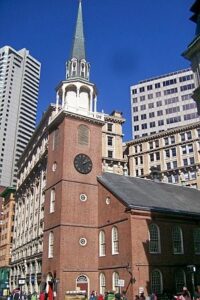 On March 5, 1774, John Hancock gave an oration at the Old South Church in Boston. He stated in part: “Some boast of being friends to government; I am a friend to righteous government, to a government founded upon the principles of reason and justice; but I glory in publicly avowing my eternal enmity to tyranny…. I have the most animating confidence that the present noble struggle for liberty will terminate gloriously for America…. Let us joyfully leave our concerns in the hands of him who raiseth up and putteth down the empires and kingdoms of the world as he pleases.”
On March 5, 1774, John Hancock gave an oration at the Old South Church in Boston. He stated in part: “Some boast of being friends to government; I am a friend to righteous government, to a government founded upon the principles of reason and justice; but I glory in publicly avowing my eternal enmity to tyranny…. I have the most animating confidence that the present noble struggle for liberty will terminate gloriously for America…. Let us joyfully leave our concerns in the hands of him who raiseth up and putteth down the empires and kingdoms of the world as he pleases.”
May we share his sentiments as we honor the 248th anniversary of the birth of our nation, and may we embrace the same confidence in our Sovereign God!

